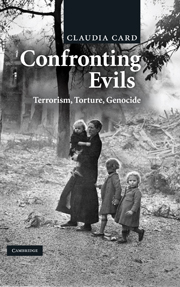Book contents
- Frontmatter
- Contents
- Preface and acknowledgements
- List of acronyms and abbreviations
- PART I The concept of evil
- 1 Inexcusable wrongs
- 2 Between good and evil
- 3 Complicity in structural evils
- 4 To whom (or to what) can evils be done?
- PART II Terrorism, torture, genocide
- Bibliography
- List of films referred to
- List of websites for international documents
- Index
1 - Inexcusable wrongs
Published online by Cambridge University Press: 05 June 2012
- Frontmatter
- Contents
- Preface and acknowledgements
- List of acronyms and abbreviations
- PART I The concept of evil
- 1 Inexcusable wrongs
- 2 Between good and evil
- 3 Complicity in structural evils
- 4 To whom (or to what) can evils be done?
- PART II Terrorism, torture, genocide
- Bibliography
- List of films referred to
- List of websites for international documents
- Index
Summary
A morally inexcusable action may fall anywhere on a continuum from culpable ignorance or weakness to deliberately and knowingly doing evil for its own sake. (Kekes 2005, p. 2)
The bombings of September 11, 2001 (hereafter 9/11), abuse of prisoners at Abu Ghraib, and mass rapes and murders in Darfur have kept terrorism, torture, and genocide in the global public eye through the first decade of this century. Responses to atrocities are a continuing source of controversy within and without congress halls and university walls. Although terrorism, torture, and genocide are today's paradigms of evil, each has been itself a response to perceived or threatened evils. A motivation for this book is the hope that atrocity victims and governments can learn to respond without doing further evil and that they can model, instead, humanitarian values. That hope takes seriously the concept of evil from a secular moral point of view.
Increasingly since 9/11, philosophers are giving sustained attention to that precise secular sense of “evil” in which it refers to especially heinous wrongs (Bernstein 2002, 2005; Grant 2006; Kekes 2005; Lara 2007; Morton 2004). At the same time, others (such as Cole 2006) remain skeptical of the value of rehabilitating the concept of evil after Friedrich Nietzsche's critique (Nietzsche 1969, pp. 24–56). Many have worried about its use as a political club and rallying tool that has the potential to stir up mass hatreds.
- Type
- Chapter
- Information
- Confronting EvilsTerrorism, Torture, Genocide, pp. 3 - 35Publisher: Cambridge University PressPrint publication year: 2010



